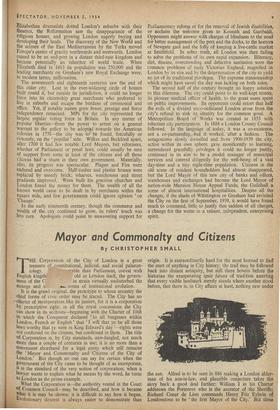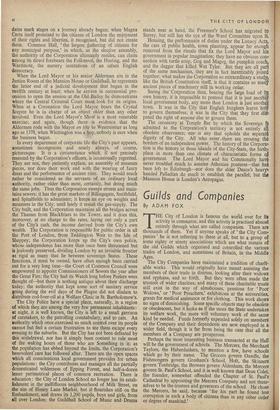Mayor and Commonalty and Citizens
By CHRISTOPHER SMALL THE Corporation of the City of London is a great treasure of constitutional, judicial, and social palaeon- tology. --rgble than Parliament, coeval with English kingshi old as London itself, the govern- ment of the C , in strata virtually undisturbed the strange and L A..... iorms of institutional evolution.
It is the grand original, the prototype to whose ancestry the chief forms of civic order may be traced. The City has no - Charter of incorporation, like its juniors, for it is a corporation by prescriptive right; in all the royal concessions the City Can show in its archives—beginning with the Charter of 1068 in which the Conqueror declared 'to all burgesses within London, French or English' that 'I will that ye be all those lows worthy that ye were in K,ing Edward's day '—rights were not conferred on the citizens, but confirmed in them. The title of Corporation is, by City standards, new-fangled, not much more than a couple of centuries in use; it is no more than a convenient shorthand for a legal entity which still remains the 'Mayor and Commonalty and Citizens of the City of London.' But though no one can say for certain when the government of the City came to be thought of as incorporate. it is the standard of the very notion of corporation; when a lawyer wants to explain what he means by the word, he turns to London as the prime example. What the Corporation is—the authority vested in the Court Of Common Council—may be described, and how it became What it is may be shown; it is difficult to say how it began. Evolu tionary descent is always easier to demonstrate than origin. It is extraordinarily hard for the most learned to find the start of anything in City history; the trail May be followed back into distant antiquity, but still there hovers before the historian the exasperating ignis fatuus of tradition asserting that every visible landmark merely stands where another stood before, that there is, in City affairs at least, nothing new under the sun. Alfred is to be seen in 886 making a London alder- man of his son-in-law, and plausible conjecture takes the story back a good deal further; William I in his Charter addresses the Portreeve who is the ancestor of the Sheriffs; Richard Coeur de Lion commands Henry Fitz Eylwin of Londonstone to be the first Mayor of the City.' But these dates mark stages on a journey already begun; when Magna Carta itself promised to the citizens of London the enjoyment of their rights and liberties, it recognised, but did not create them. Common Hall, the largest gathering of citizens for any municipal purpose,' in which, as the elec,tive assembly, the authority of the Corporation ultimately resides, can claim among its direct forebears the Folkmoot, the Husting, and the Wardmote, the nursery institutions of an infant English democracy. When the Lord Mayor or his senior Alderman sits in the Justice Room of the Mansion House or Guildhall, he represents the latter end of a judicial development that began in the twelfth century at least; when he arrives in ceremonial pro- cession to open the session .at the Old Bailey he demonstrates where the Central Criminal Court must look for its origins. When at a Coronation the Lord Mayor bears the Crystal Sceptre he is in charge of an object older than any other Involved. Even the Lord Mayor's Snow is a most venerable exercise; and again, though there is evidence that the Aldermen rode with the Mayor en fete to Westminster as long ago as 1378, when Whittington was a 4oy, nobody is sure when the business began. In every department of corporate life the City's past appears, sometimes incongruous and nearly always, of course, picturesque. It is a circumstance which, if not precisely resented by the Corporation's officers, is occasionally regretted. They are not, they patiently explain, an assembly of museum pieces, nor does their work end with the wearing of fancy dress and the performance of ancient rites. They would much rather be considered as the servants of an ordinary local authority, rather older than most, certainly, but doing much the same jobs. Thus the Corporation sweeps streets and main- tains sewers; it has the great markets of Billingsgate, Smithfield, and Spitalfields to administer; it keeps an eye on weights and measures in the City; until lately it tested the gas-supply. The City built, and the Corporation maintains all the bridges across the Thames from Blackfriars to the Tower, and it does this, moreover, at no charge to the rates, laying out only a part of the City's cash, the income derived from the City's own wealth. The Corporation is responsible for public order in all the Port of London, from Teddington Weir to the Isle of Sheppey; the Corporation keeps up the City's own police, whose independence has more than once been threatened but is jealously preserved, dividing London by an invisible frontier as rigid as many that lie between iovereign States. These functions, it must be owned, have often enough been carried out for a very long time—the Court of Common Council were empowered to appoint Commissioners of Sewers the year after the Great Fire; the City had its Watch long before Peelers were thought of—but there is nothing antique about their discharge today; the authority that kept some -sort of sanitary service going during the evil days of the Plague did not disdain to distribute cod-liver-oil at a Welfare Clinic in St. Bartholomew's.
The City Police have a special place, naturally, in a region of which they are among the very few permanent inhabitants : at night, it is well known, the City is left to a small garrison of caretakers, to the patrolling constabulary, and to cats. An authority which once lexercised so much control over its people cannot but feel a certain frustration to see them escape every evening to the suburbs. But the City has not been defeated by this withdrawal, nor has it simply been content to rule most of the waking hours of those who are Something in it; as the population has ebbed beyond the limits, the Corporation's benevolent carehas followed after. There are the open spaces which all conscientious local government provides for urban populations: the City contributes and manages all the partially domesticated wilderness of Epping Forest, and half-a-dozen lesser perimetrical places of common recreation. There is education : the City of London School no longer has its estab- lishment in the mellifluous neighbourhood of Milk Street, on the site of Honey Lane Market, but it flourishes still on the Embankment, and draws its 1,200 pupils, boys and girls, from all over London; the Guildhall School of Music and Drama stands near at hand, the Freemen's School has migrated to Surrey, but still has the eye of the Ward Committee upon ft, Housing, the performance of duties under the Lunacy Acts, ' the care of public health, town planning, appear far enough removed from the rituals that fix the Lord Mayor and his government in popular imagination; they have no obvious con. nection with turtle soup, Gog and Magog, the pumpkin coach, and the dagger that killed Wat Tyler. But they are all part of the same mechanism, they are in fact inextricably joined together; what makes the Corporation so extraordinary a studyi like the British Constitution itself, is that it contains so many ancient pieces of machinery still in working order. Seeing the Corporation thus, bearing the large load of I own history, it is impossible to pretend that it is just anoth local government body, any more than London is just anoth town. It was in the City that English burghers learnt ho to govern themselves; it was in the City that they first dig, puted the right of anyone else to govern them.
The ceremony at Temple Bar by which the Sovereign admitted to the Corporation's territory is not entirely atI obsolete observance; nor is any that upholds the separat dignity of the City. All who enter .there are crossing th6 borders of an independent power. The history of the Corpora+ tion is the history in these islands of the City-State, the birth7 place in more than one climate of characteristic forms 0 government. The Lord Mayor and his Commonalty have never troubled much to assume Athenian postures—that ha6 been left to Edinburgh—nor does the elder Dance's heavyi handed Palladian do much to establish the parallel; but the Mansion House is London's Areopagus.



































































 Previous page
Previous page